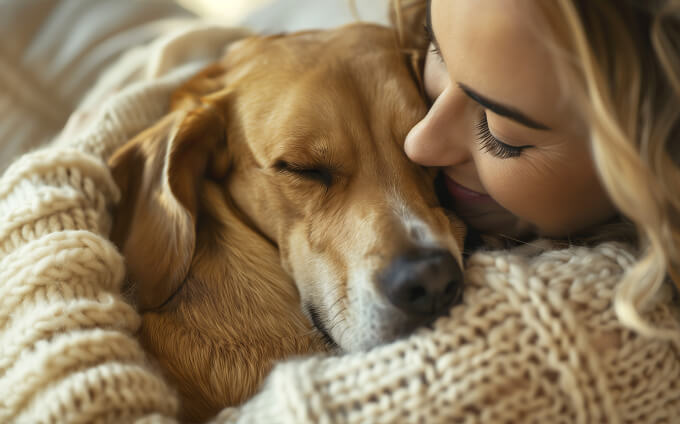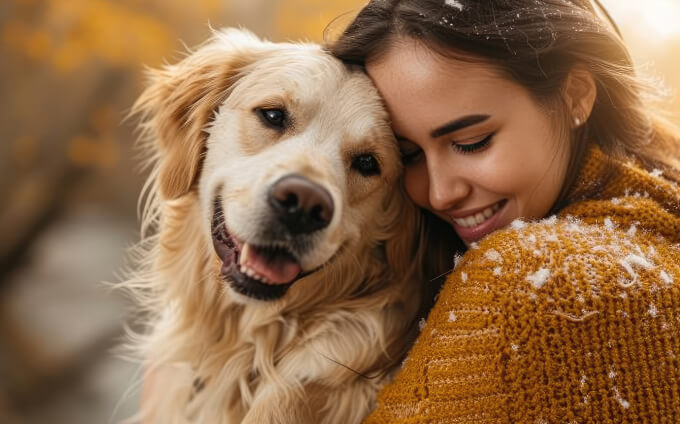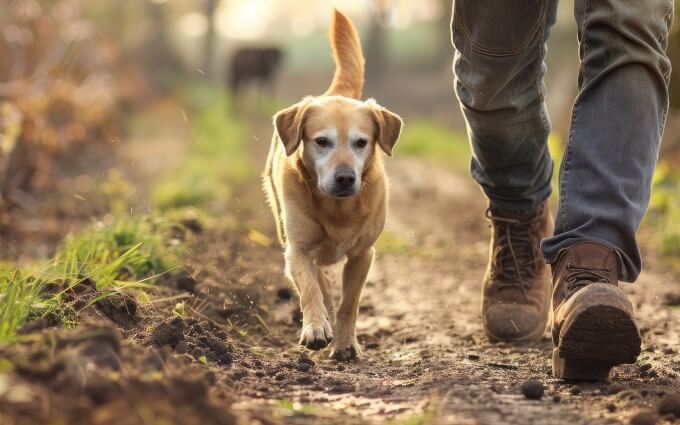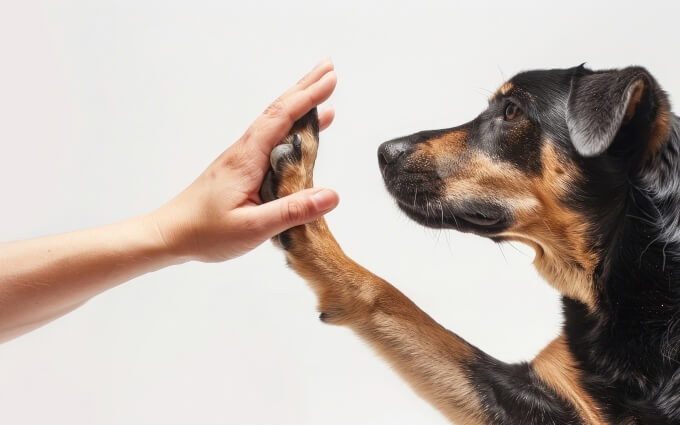- Home
- Dog Behavior
- Does My Dog Know I Care About It?
Does My Dog Know I Care About It?
Discover the ways your dog shows it knows you care and how you can reinforce that loving bond through simple actions and daily interactions.

- 44

Your Dog Knows that You Care
The short answer is yes, your dog knows you care. Dogs are incredibly adept at picking up on our emotions and actions. They are social creatures that thrive on close contact and love from their owners. But how do we really know that the dog understands our love? It's all about behavior and body language.
The Eye Contact Connection
Ever noticed your dog gazing lovingly into your eyes? This isn't just a cute moment; it's a sign of trust and affection. Dogs make eye contact with their owners as a way of bonding, and this action releases oxytocin, the love hormone, in both of you. So next time your pup gives you those puppy eyes, know that they're saying, 'I love you.'
Body Language and Physical Affection
Your dog's body language can tell you a lot about how they feel. When your dog leans against you, sits on your feet, or curls up next to you, they're showing they feel safe and secure with you. These actions are their way of seeking comfort and expressing affection. Gentle petting, ear scratches, and belly rubs are also ways dogs enjoy and understand your love.
- Leaning on You:Dogs lean on their humans to feel close and connected.
- Sitting on Your Feet:This indicates they want to be close and keep tabs on you.
- Sleeping Near You:Dogs consider sleeping a vulnerable activity, so choosing to do it close to you means they trust you immensely.
Actions Speak Louder Than Words
While your dog may not understand the words 'I love you,' they definitely understand the actions behind those words. Consistent quality time, whether it's through play, walks, or just being together, strengthens your bond. Dogs thrive on routine and knowing what to expect, so your attention and care are clear indicators to them that you love them.
Ways to Show Love:
- Playtime:Regular play sessions help build a strong bond.
- Walks:Exploring together reinforces your role as the pack leader.
- Cuddle Time:Inviting them to snuggle shows you see them as part of your family.
Understanding Canine Empathy
Dogs are known for their empathetic nature. If you've ever had a rough day and your dog comes to comfort you, it's not just coincidence. Studies suggest that dogs can sense your emotions and respond accordingly, often trying to comfort you by staying close, nuzzling, or licking your hand. This behavior shows that they care about your well-being and want to support you.
Signs of Empathy:
- Nuzzling and Licking:When you're sad, your dog might nuzzle you to offer comfort.
- Staying Close:Dogs will often stick by your side when they sense you're upset.
- Responsive Behavior:They may adjust their behavior based on your mood, becoming more subdued if you're sad or anxious.
Behavioral Signs of Love
Beyond empathy, there are several behaviors that indicate your dog knows you love them. Bringing you their favorite toy, wagging their tail enthusiastically when they see you, and following you around the house are all signs that your dog feels loved and reciprocates those feelings. Each dog is different, but these common behaviors are strong indicators of a loving bond.
- Bringing Toys:When your dog brings you their toy, it's a gesture of trust and affection.
- Tail Wagging:A vigorously wagging tail is a universal sign of a happy dog.
- Following You:Dogs that shadow you around the house do so out of love and the desire to be near you.
The Importance of Consistency
Consistency in your actions and behavior helps your dog understand that they are loved. Regular routines, positive reinforcement, and consistent care all contribute to a stable and loving environment for your pet. Dogs appreciate knowing what to expect, and this predictability helps them feel secure and loved.
Ways to Be Consistent:
- Routine Walks:Stick to a regular schedule for walks and playtime.
- Positive Reinforcement:Reward good behavior consistently to reinforce the bond.
- Daily Interaction:Spend quality time with your dog every day, whether through play, training, or relaxation.
Frequently Asked Questions about Dogs Knowing You Care
Does my dog know that I care about it?
Yes, dogs can sense care and love through your actions, tone of voice, and consistent attention.
How do dogs recognize love from their owners?
Dogs pick up on affectionate gestures like petting, playing, feeding, and spending time together.
Can my dog feel when I am affectionate towards it?
Yes, dogs are highly sensitive to human emotions and can feel when you are showing affection.
What signs show that my dog knows I care?
Signs include tail wagging, following you around, seeking cuddles, and showing excitement when you return.
How can I strengthen the bond so my dog feels loved?
Spend quality time, use positive reinforcement, provide care, and engage in activities your dog enjoys.
Conclusion: A Bond Like No Other
Your dog may not speak your language, but they understand the universal language of love through your actions and attention. From maintaining eye contact to sharing cuddles and ensuring consistent care, there are many ways your dog knows you care. By paying attention to their body language and responding with affection, you reinforce the bond that makes your relationship with your dog truly special.
- 44
 Cassandra Dalgaard
Cassandra Dalgaard
Cassandra is an energetic dog owner who loves spending time outdoors with her 4-year-old German Shepherd, Max. They can often be found hiking in the woods, where Cassandra enjoys nature and Max explores his surroundings with great curiosity. Cassandra trains Max in tracking, an activity they both find very rewarding. In the evenings they relax at home, where Cassandra often reads a book while Max lies at her feet. Cassandra also volunteers at a local dog club where she helps organize training sessions and social events for dogs and their owners. For Cassandra, Max is more than just a dog - he's her best friend and faithful companion.
-
Food & Nutrition
 The Best Foods to Boost Your Dog's Immune System
The Best Foods to Boost Your Dog's Immune SystemTo keep your dog healthy and resilient, fueling their immune system with the right foods is key. In this post, we'll cover the top nutrient-packed foods that can give your dog's immune system the support it needs, helping them fend off illness and stay energetic.
 Marcin SolgaardOct 04, 20249
Marcin SolgaardOct 04, 20249 -
Dog health
 Which Emotions Do Dogs Actually Experience? Understanding Your Dog's Emotions
Which Emotions Do Dogs Actually Experience? Understanding Your Dog's EmotionsDogs experience a variety of basic emotions similar to those of a young child. Learn about the emotions your dog truly feels, how they express them, and what it means for your relationship.
 Cassandra DalgaardJul 30, 202478
Cassandra DalgaardJul 30, 202478 -
Tips & Tricks
 How to Train Your Dog to Walk Off-Leash
How to Train Your Dog to Walk Off-LeashThis guide will walk you through everything you need to know, from essential commands to mastering off-leash walks even in distracting environments
 Marcin SolgaardJul 02, 202451
Marcin SolgaardJul 02, 202451 -
Tips & Tricks
 How to Train Your Dog to Give Paw
How to Train Your Dog to Give PawTeaching your dog to give paw is a fun and rewarding experience that strengthens your bond. This guide walks you through the process with tips, tricks, and plenty of paw-sitive reinforcement.
 Marcin SolgaardApr 11, 202441
Marcin SolgaardApr 11, 202441 -
Tips & Tricks
 Are You Ready for Life with a Dog? Everything You Need to Know
Are You Ready for Life with a Dog? Everything You Need to KnowThis guide helps you determine if you're ready for a dog by exploring the responsibilities, financial requirements, and lifestyle changes necessary for successful dog ownership.
 Marcin SolgaardJul 31, 202433
Marcin SolgaardJul 31, 202433 -
Tips & Tricks
 How to Teach Your Dog to Come When Called
How to Teach Your Dog to Come When CalledThis guide walks you through the process, from selecting the right command to dealing with distractions, ensuring a strong recall every time.
 Marcin SolgaardJul 10, 202448
Marcin SolgaardJul 10, 202448 -
Food & Nutrition
 How to Choose the Right Diet for Your Allergic Dog
How to Choose the Right Diet for Your Allergic DogFind out how to select the perfect diet for your dog with allergies. Learn about elimination diets, hypoallergenic foods, and the best ingredients to keep your furry friend healthy and happy.
 Marcin SolgaardJun 09, 202427
Marcin SolgaardJun 09, 202427 -
Puppies & Young dogs
 How to Puppy-Proof Your Home: A Complete Guide
How to Puppy-Proof Your Home: A Complete GuideBringing a new puppy home is thrilling, but keeping them safe means some serious puppy-proofing. This guide covers everything from securing hazardous items to creating a puppy-friendly zone, making your home a safe haven for your curious new companion.
 Michelle TorringOct 10, 202412
Michelle TorringOct 10, 202412 -
Dog health
 Essential Tips for Caring for Your Dog's Teeth and Gums
Essential Tips for Caring for Your Dog's Teeth and GumsMaintaining your dog's dental health is crucial for their overall well-being. This guide covers various methods to care for your dog's teeth and gums, ensuring they stay healthy and happy.
 Cassandra DalgaardAug 19, 202436
Cassandra DalgaardAug 19, 202436 -
Tips & Tricks
 How to Keep Your Dog Off the Furniture
How to Keep Your Dog Off the FurnitureEnsuring your dog stays off the furniture can be a challenge, but with the right techniques and consistency, you can create a pet-friendly environment that respects your space.
 Marcin SolgaardJun 24, 202439
Marcin SolgaardJun 24, 202439










